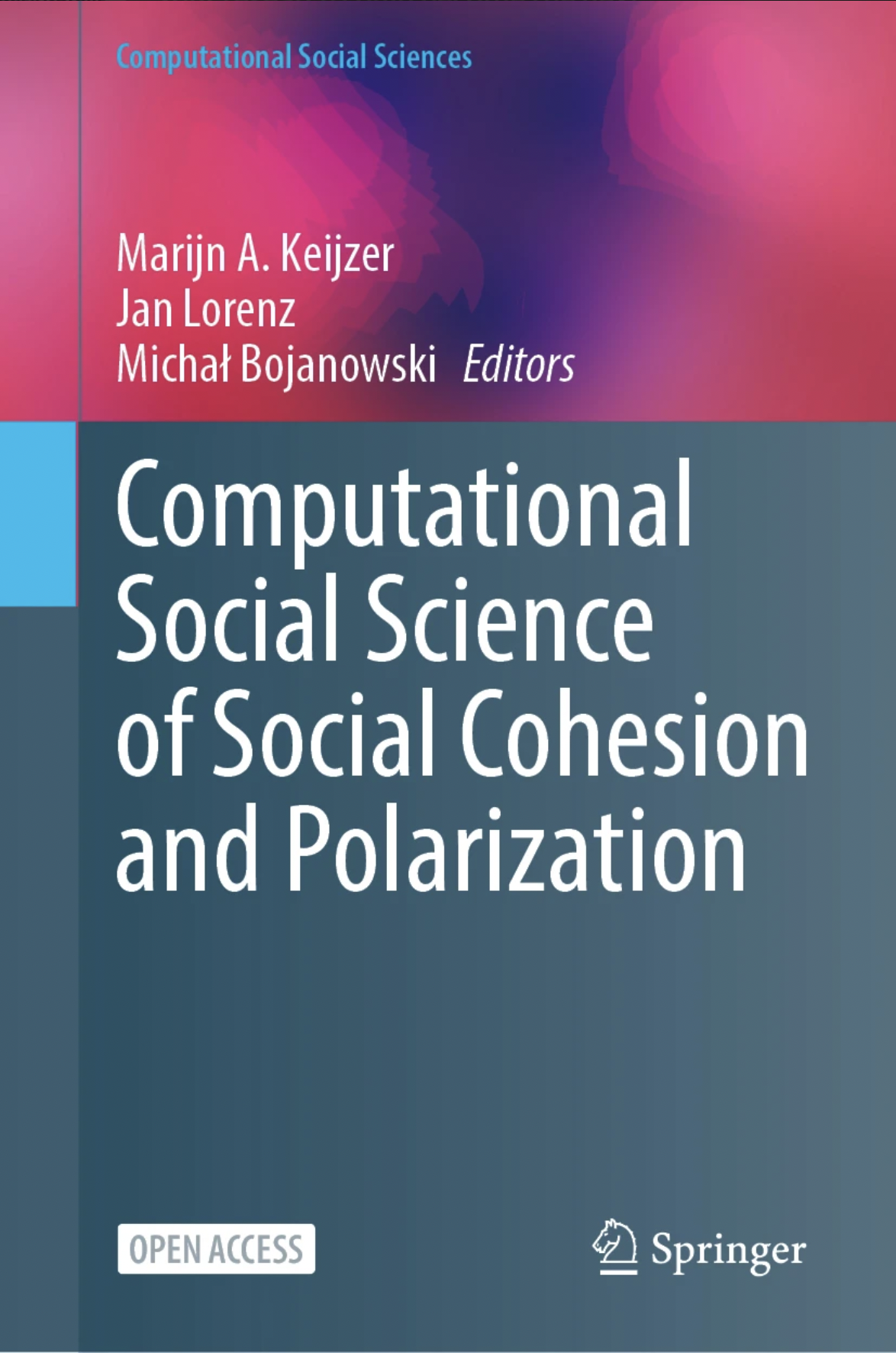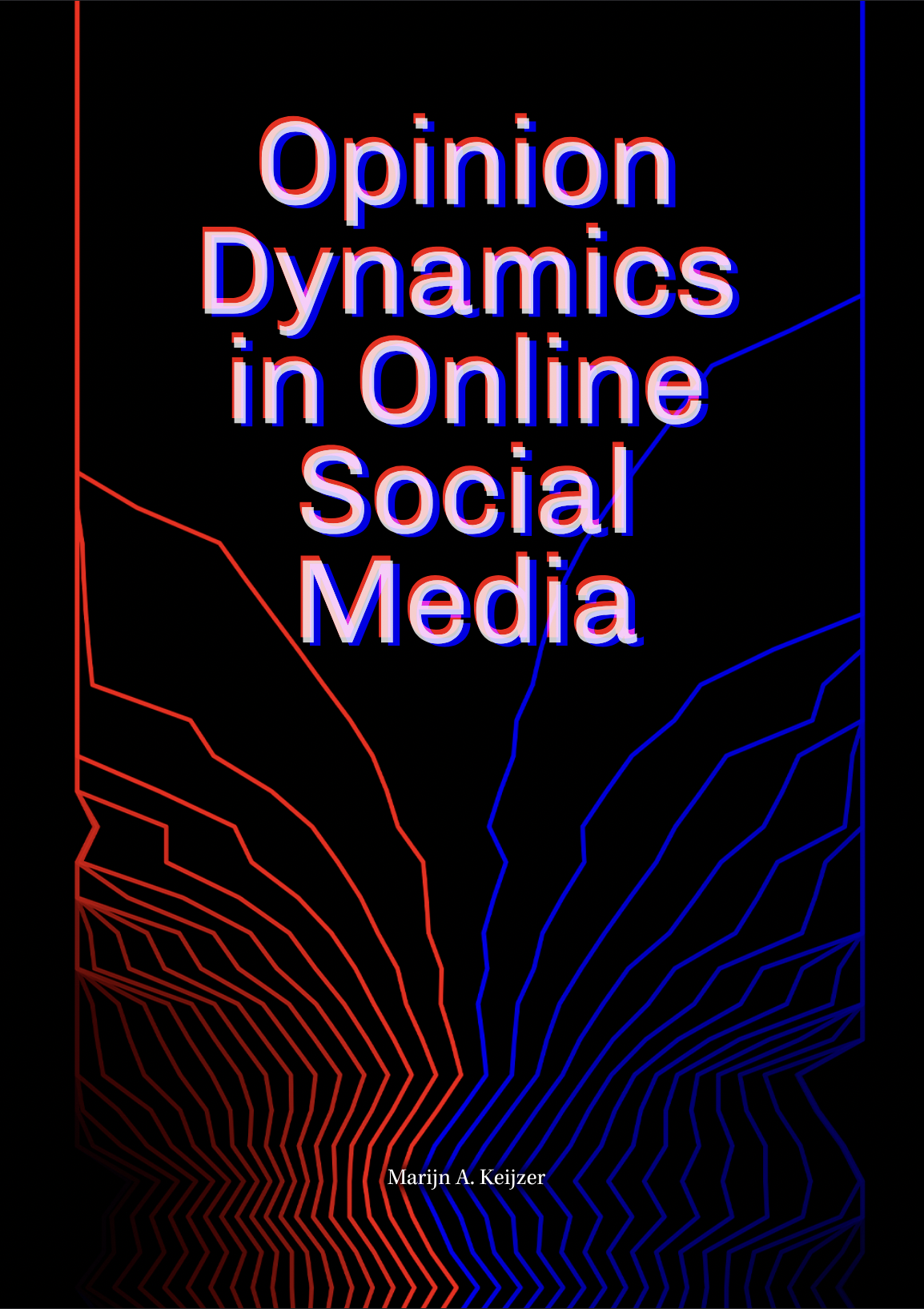Publications
Peer-reviewed publications
Steiglechner, Keijzer, Smaldino, Moser & Merico (2024). Noise and opinion dynamics: How ambiguity promotes pro-majority consensus in the presence of confirmation bias. Royal Society of Open Science
Keijzer, Mäs & Flache (2024). Polarization on social media: Micro-level evidence and macro-level implications. Journal of Artificial Societies and Social Simulation
Terzopoulou, Keijzer, Gogulapati & Heitzig (2023). The Rule–Tool–User Nexus in digital collective decisions. AAMAS 2023
Keijzer & Corten (2023). Socioeconomic status, reputation, and interpersonal trust in peer-to-peer markets: Evidence from an online experiment. Rationality & Society
Keijzer & Mäs (2022). The complex link between filter bubbles and opinion polarization. Data Science
Keijzer & Mepham (2021). Een Pandemie van Polarisatie? [A Polarization Pandemic?]. Mens & Maatschappij, 96(2): 179-211
Keijzer & Mäs (2021). The Strength of Weak Bots. Online Social Networks and Media
Keijzer, Mäs & Flache (2018). Communication in Online Social Networks Fosters Cultural Isolation. Complexity
Preprints
Deffuant, Keijzer & Banisch (2025). How opinions get more extreme in an age of information abundance
Keijzer, Golan, Coiciu, Burgerhof, Llulla & Faber (2022). CovidTube: Mapping information segregation on YouTube
Books
Keijzer, Lorenz & Bojanowski (Eds.) (2026). Computational Social Science of Social Cohesion and Polarization, Springer.
Book Chapters
Keijzer, Lorenz & Bojanowski (2026). Computational Social Science of Social Cohesion and Polarization. In Keijzer, Lorenz & Bojanowski (Eds.) Computational Social Science of Social Cohesion and Polarization, Springer.
Keijzer, Erhard, Kharazian & Lamba (2026). The Anatomy of Rabbit Holes: Studying Information Segregation in YouTube’s Recommendation Graph. In Keijzer, Lorenz & Bojanowski (Eds.) Computational Social Science of Social Cohesion and Polarization, Springer.
Flache, Keijzer & Mäs (2025). Agent-based models and networks. In Yasseri (Eds.) Handbook of Computational Social Science, Cheltenham: Edward Elgar.
Flache, Mäs & Keijzer (2022). Computational approaches in rigorous sociology: Agent-based computational sociology and computational social science. In Gërxhani, De Graaf, & Raub (Eds.), Handbook of Sociological Science: Contributions to Rigorous Sociology, Cheltenham: Edward Elgar.
Software
Laukemper, Keijzer & Bakker (2019). defSim: the Discrete Event Framework for Social Influence Models
Other publications
Steiglechner & Keijzer (2025). Make some noise! Why agent-based modelers should embrace the power of randomness. Review of Artificial Societies and Social Simulation
Keijzer (2022). If you want to be cited, calibrate your agent-based model: Reply to Chattoe-Brown. Review of Artificial Societies and Social Simulation
Keijzer (2022). Opinion Dynamics in Online Social Media. Groningen: ICS-dissertations
De Matos Fernandes & Keijzer (2020). No one can predict the future: More than a semantic dispute. Review of Artificial Societies and Social Simulation
Talks
Invited talks
Inside the Echo Chamber. Model discrimination using macro-experiments. Presented at the LABSS seminar, National Research Council of Italy (CNR) (Rome, Italy) in 2025
The long term consequences of social influence. Presented at the SOD seminar, University of Southern Denmark (Odense, Denmark) in 2025
Coordination under affective polarization. Presented at the Colloquium on Analytical Sociology, European University Institute (Florence, Italy) in 2024
The strength of weak bots. Presented at the International Roundtable on Computational Social Science, Institute for Analytical Sociology (Norrköping, Sweden) in 2023
The complex link between filter bubbles and opinion polarization. Presented at the IRIT external seminar, University of Toulouse 1 Capitole (Toulouse, France) in 2022
Conference talks
Social distinction or actual disagreement? Experimental evidence from a coordination game for political decision-making @ International Network of Analytical Sociologists 2024 (Leipzig, Germany)
The strength of weak bots @ ESSA’s Social Simulation Conference 2022 (Milan, Italy)
Micro-foundations of polarization in online social media @ Annual Conference for Experimental Sociology 2021 (Ascona, Switzerland)
Micro-foundations of polarization in online social media: A model In the lab fed back into the model @ ESSA’s SocSimFesT 2021 (online)
Validating models of opinion polarization on the micro-level @ European Symposium Series on Societal Challenges in Computational Social Science, 2019: Polarization and Radicalization (Zürich, Switzerland)
Designing Social Influence Experiments @ Sixth International Meeting on Experimental and Behavioral Social Sciences (Utrecht, The Netherlands)
Communication in Online Social Networks Fosters Cultural Isolation @ 2018 Annual Meeting of the American Sociological Association (Philadelphia PA, USA)
Communication in Online Social Networks Fosters Cultural Isolation @ XXXVIII Sunbelt Conference 2018 (Utrecht, The Netherlands)
Cultural Dynamics in Online Social Networks @ Interdisciplinary Workshop on Opinion Dynamics and Collective Decision 2017 (Bremen, Germany)
Interaction in online social networks and homogeneity @ International Network of Analytical Sociologists 2017 (Oslo, Norway)
Vignette experiment on socioeconomic status and trust @ International Network of Analytical Sociologists 2016 (Utrecht, The Netherlands)
Workshops & tutorials
Agent-based modeling in NetLogo @ BIGSSS Summer School in Computational Social Science of Democratic Debate, 2023 (Bremen, Germany). Co-lecturer: Jan Lorenz.
Social Influence Modeling in Python Using defSim @ European Social Simulation Association’s SocSimFest 2021 (Online). Co-organizers: Dieko Bakker & Anton Laukemper.
Validating models of opinion polarization on the micro-level @ European Symposium Series on Societal Challenges in Computational Social Science, 2019: Polarization and Radicalization (Zürich, Switzerland). Co-organizers: Andreas Flache, Michael Mäs & David Garcia.
Media
Coverage
TSE Mag (04/22/2024) The myths of polarization
TSE Reflect (03/25/2024) Should we burst our filter bubbles?
De Volkskrant (07/28/2023) Voeden algoritmen in sociale media polarisatie in de samenleving? ‘Ze zijn krachtig. Maar mensen ook’ (Do algorithms in social media fuel societal polarization? ‘They are powerful. But people are too’)
De Volkskrant (07/15/2023) Oneens online: Neemt polarisatie in Nederland toe door de komst van sociale media? ‘Misschien is de echte filterbubbel wel in real life’ (Disagreement online: Does polarization increase in the Netherlands because of social media? ‘Maybe the actual filter bubble is in real life’)
IAST Magazine (02/20/2023) Is social media tearing us apart?
I contributed to a national campaign in the Netherlands, organized by SIRE (2023) Verlies elkaar niet: Als polarisatie dichtbij komt (Do not lose each other: When polarization comes closer)
Argos Medialogica (2022) Neemt polarisatie toe door filterbubbels op sociale media? (Does polarization increase because of filter bubbles on social media?)
NEMO Kennislink (02/04/2022) Zorgen sociale media voor meer polarisatie? (Do social media cause more polarization?)
Radio 1 (01/19/2022) Interview about my dissertation in Radio 1 Journaal
PNAS News Feature (09/14/2021) Modeling the power of polarization
SciencePOD (07/05/2019) The (anti)social network – How online communication may increase cultural isolation
Documentary ‘Digitale Kruimels’ (digital breadcrumbs) by Matjeu Witte →
Commentary
De Volkskrant (05/13/2024) Groot onderzoek VS naar Facebook toont weinig invloed op polarisatie aan. Maar wat werd er precies onderzocht? (Major US research into Facebook shows little influence on polarization. But what was investigated exactly?)
Radio 2 (09/26/2020) Zorgt social media voor meer polarisatie? (Do social media cause more polarization?)
NOS (03/28/2019) ‘Strengere regels Facebook tegen extreem-rechts toegejuicht, maar ook twijfel’ (Facebook’s stricter rules against the far right welcomed, but there are also doubts)
Reformatorisch Dagblad (02/16/2019) ‘,,Besef dat YouTube je naar het extreme kan leiden’’’ (Realize that YouTube can lead you to the extreme)
NOS (12/23/2016) ‘Zo bepalen algoritmes jouw wereldbeeld’ (This is how algorithms determine your world view)
| Website created with R Markdown | Last updated on |

